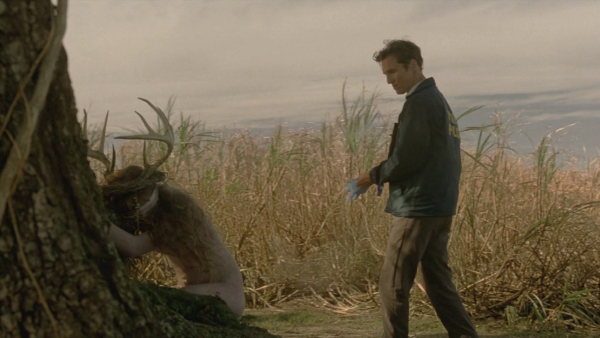
Not a battle between good and evil but a battle between values and valour--that's True Detective. A show that gave me exactly what I asked for--a series where every episode was written by one person, every episode was directed by one person. It's because of that, I think, the show has such extraordinary narrative coherence. The eight episodes fit together tightly to nicely deliver a story on the conflict between people who handle the treachery of existence in different ways.
Superficially, you could describe the show as a cross between Twin Peaks and The Wicker Man but thematically it's more like Dirty Harry meets the Cthulu cult.

True Detective's director, Cary Joji Fukunaga, said, "I always ask, how did David Lynch do 'Twin Peaks'? Did they do it episodically, did they take breaks?" Well, certainly David Lynch took breaks. Of the thirty episodes of Twin Peaks, David Lynch directed only six. Two of those episodes were two hours long and he directed Fire Walk With Me, the prequel movie that followed the series, so he provided around ten hours of Twin Peaks compared to the eight True Detective episodes Fukunaga made. But in being broken up by episodes from a series of directors with more commonplace faculties of imagination, Lynch was forced to work around dumb ideas, some of them outright undoing some of his initial work, such as his characterisation of the relationship between Agents Cooper and Rosenfield which goes from charmingly weird to dully contentious. It's part of Cooper's descent from an amoral lover of life to fussy, boring do-gooder.

True Detective begins with a murder scene not unlike the one from Twin Peaks--a young beautiful woman is found tied up having been raped and murdered. But instead of seeing her discovery by a civilian portrayed by an actor with a performance as distinctive as Jack Nance's, we start with the detectives already at the crime scene. And her body is not covered by plastic and we don't see her face or learn her identity for some time.
Masks and the fundamentally illusory nature of identity are a major part of the story. The series title, True Detective, is very appropriate because its protagonists, police detectives Rust Cohle (Matthew McConaughey) and Martin Hart (Woody Harrelson), demonstrate how they are fundamentally detectives by nature. Even when they aren't officially employed in that capacity, even when they have every reason in the world not to go on with their work, they keep going, almost like an addiction.

Incidentally, I'd like to thank Jameson Irish Whiskey for being the most conspicuous whiskey on the show and so presumably being the most generous sponsor. We see Captain Morgan and Jim Beam and Macallan but Cohle and Hart have a very clear favourite.

Going back to the first murder victim for a moment, the only real complaint I have about the series is its attitude towards women. Aside from Hart's wife and daughters, a woman he cheats on his wife with, and a woman confessing to infanticide, every woman on the show is a prostitute or stripper with no characterisation beyond that. Hart's mistress gets no characterisation beyond the fact that she's kinky and has no illusions about a lasting relationship with Hart. And Hart's wife, Maggie (Michelle Monaghan), comes from the Don Siegel cop movie tradition of the woman who's not much more than a thorn in the side of the male protagonist. Though at least in this case Maggie seems quite reasonable in being angry with her adulterous husband and she provides some genuine insight into his character by explaining that his actions come from the fact that he never really figured out who he was.

Detective Hart is kind of the fulcrum of the story and, as the episodes progress, his choice between going in with Cohle's camp and going in with the hollowness of Christianity in the American south is the main but subtle method the show uses to get its ideas across.

Cohle is much further down the road, the death of his child and his subsequent divorce have left him a self-described "pessimist"--he sees no salvation, he rests everything on his own resolve and integrity, things which only waver due to the sinister temptation of a woman's body. The villains of the series seem to use a form of pagan ritual to reveal the full nature of women to be the sexuality of their bodies. If it weren't for the aforementioned insight Maggie demonstrates early on it would almost seem like series writer Nic Pizzolatto agrees with the villains on that point.
Hart finds Cohle's secularism vulgar and offensive. His hypocrisy at the beginning of the series echoes the larger hypocrisy of the network of Christian administrators throughout the southern states whose conspiracy hides a culture of ritual sacrifice.

The performances of the leads on this show are crucial so it's good that talents as renowned as McConaughey and Harrelson were drawn to it. There are special effects, there are action sequences, there's gore, but one of the things I loved most about this series is how much of it is portrayed through Cohle's and Hart's reactions. Because a special effect, however good it is, is always going to be a special effect. The emotional reality of Hart's reaction to a video tape he's shown--which we don't see--is always going to be more effective. And I would put that down to the H.P. Lovecraft influence on the show. So much of the sense of cold, vast, dangerous reality is conveyed by the impression of the characters' continuous consciousness of it.


No comments:
Post a Comment